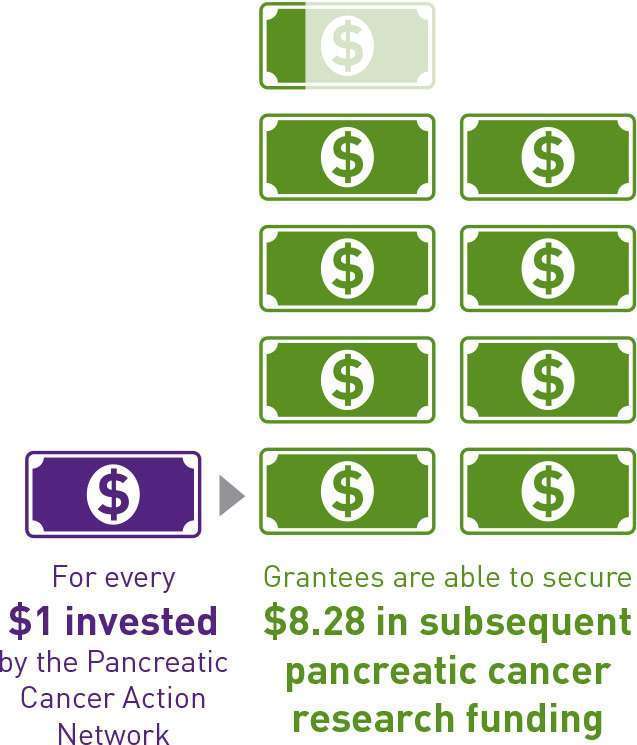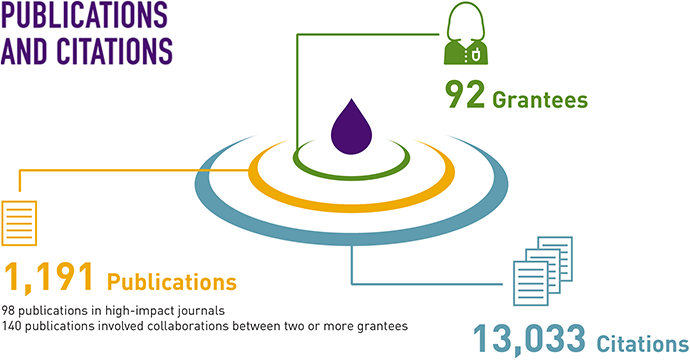In 2010, promising investigator Jonathan Brody, PhD, received a $200,000 Career Development Award from the Pancreatic Cancer Action Network, funded in honor of the legacy of Skip Viragh. Over the next five years, Dr. Brody was able to secure an additional $1.7 million in pancreatic cancer research funding from other sources, including support from both federal and private agencies. And in 2015, he was again the recipient of one of our grants – this time, a $1 million Research Acceleration Network Grant.
Dr. Brody’s steadily increasing support was a direct result of the quality of his research, as evaluated by experts in the field. His earlier foundational work on a protein thought to predict pancreatic cancer cells’ response to chemotherapy led to the exciting personalized medicine clinical trial he is conducting now. And both his research and his additional funding have strengthened his commitment to studying pancreatic cancer and spurred his career advancement at Thomas Jefferson University in Philadelphia.
 Success in extending research support from initial funding from our organization is by no means unique to Dr. Brody. In the most recent evaluation of our Research Grants Program, our grantees turned, on average, every dollar awarded by our organization into an amazing $8.28 in subsequent funding to support their pancreatic cancer research.
Success in extending research support from initial funding from our organization is by no means unique to Dr. Brody. In the most recent evaluation of our Research Grants Program, our grantees turned, on average, every dollar awarded by our organization into an amazing $8.28 in subsequent funding to support their pancreatic cancer research.
Every other year, we systematically examine our grantees’ success in generating additional funding for pancreatic cancer research, publishing their findings in peer-reviewed scientific journals and having their research cited in other publications. All of these achievements help further scientific knowledge on pancreatic cancer.
This year, we evaluated researchers who received grants from our organization starting in 2003 up until 2013, in order to allow the investigators time to seek and receive subsequent funding and publish their work. During the eleven-year period we evaluated, we awarded 94 grants totaling $17.6 million to 92 researchers. These researchers leveraged that $17.6 million into an impressive $146 million to support additional research aimed at improving our ability to understand, diagnose and treat pancreatic cancer.
As for their publications, the 92 grantees we evaluated authored a remarkable 1,191 articles in peer-reviewed biomedical journals. Nearly 100 of these articles were published in what are considered high-impact journals, which are widely read and contain articles that are frequently cited. In fact, our grantees’ articles have already been cited more than 13,000 times in other papers published in biomedical journals, which means other researchers are reading, learning from and building upon our grantees’ work.

One of the most prestigious high-impact scientific journals is Nature – and that’s where our talented early-career researcher Cosimo Commisso, PhD, published findings about a cellular process that helps “feed” pancreatic cancer cells and promote tumor progression. Since its publication in 2013, that single paper has already been referenced more than 60 times in other scientific articles.
The project that Dr. Commisso describes in his Nature paper was conducted while he was a postdoctoral fellow training at New York University School of Medicine, supported by one of our $45,000 Fellowship Awards, funded in memory of Samuel Stroum. Owing to the quality of his work, Dr. Commisso was appointed assistant professor to run his own lab at the Sanford-Burnham Medical Research Institute in La Jolla, California. This year, he received the $200,000 Skip Viragh – Career Development Award from our organization, allowing him to pursue next steps in his project – assessing strategies to block the cellular process illuminated in his earlier research.
As an organization, we will continue to gauge how well our grantees are leveraging the more than $28 million we have awarded since 2003 and expanding the reach and impact of their scientific findings. It is important to us to ensure sound stewardship of our research grant investment and provide a measure of accountability to our constituents.
“We track and monitor our Research Grants Program on an ongoing basis and rigorously evaluate the program every two years because we owe it to everyone who invests in our mission,” said Julie Fleshman, president and CEO of the Pancreatic Cancer Action Network. “Whether someone makes a $100 donation to a PurpleStride® team or a $1 million gift to fund one of our Research Acceleration Network Grants, they deserve to know that their money is being used wisely and effectively.”
Fleshman continued, “In fact, we are accountable to everyone impacted by pancreatic cancer: past, present and future. In order to fulfill our goal to double pancreatic cancer survival by 2020, we fund only the most meritorious research with the potential to have a powerful impact on patient outcomes. The results of this most recent evaluation show that our grant recipients are growing the field of pancreatic cancer research exponentially and moving us ever closer to meeting our goal.”
If you are interested in continuing to expand the field of pancreatic cancer research by supporting our organization and our Research Grants Program, contact donorrelations@pancan.org.





